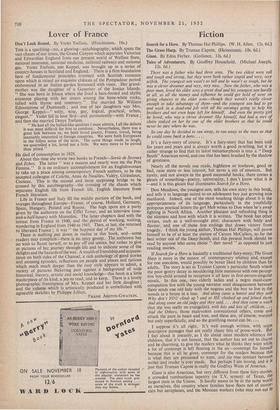Lover of France
Don't Look Round. By Violet Trefusis. (Hutchinson. 16s.)
THIS is a sparkling—no, a glowing—autobiography, which spans the vast chasm of our times, the Grand Canyon which separates Victorian and Edwardian England from our present world of Welfare State, national insurance, national medicine, national railways and national gas. Violet Trefusis, nee Keppel, was brought up in a series of country-houses in Scotland and England. There is a firm foundation here of fundamental principles trimmed with Scottish romance upon which is• raised an exquisite château of the Pompadour period embowered in an Italian garden festooned with vines. Her grand- mother was the daughter of a Governor of the Ionian Islands. " She was born in Ithaca where she lived a bare-footed and idyllic existence playing with her sisters among the bone-white rocks, tufted with thyme and rosemary." She married Sir William Edmonstone of Duntreatlf ; and one of her daughters was Mrs. George Keppel—" witty, wise, gay, logical, practical, urban, elegant." Violet fell in love first—and permanently—with France ; and then she married Denys Trefusis.
" He had all the ballad-like qualities I most admire, 1 all the defects
it was most difficult for him to condone. Nevertheless, there was a great link between us, we both loved poetry, France, travel, being insatiably interested in foreign countries. We were both Europeans in the fullest sense of the term. The same things made us laugh, we quarrelled a lot, loved not a little. We were more to be envied than pitied."
He died of consumption in 1929.
About this time she wrote two books in French—Sortie de Secours and Echos. The latter " was a success and nearly won me the Prix Femina." It is no ordinary 'accomplishment for an Englishwoman to take up a place among contemporary French authors, to be the accepted colleague of Colette, Anna de Noailles, Valery, Giraudoux, Cocteau. This is the second and most surprising bridge to be crossed by this autobiography—the crossing of the chasm which separates English life from French. life, English literature from French literature.
Life in France and Italy fill the middle portion of the book, and voyages throughout Europe—France, of course, Holland, Germany, Spain, Hungary, Poland and Russia. The high spots are a party given by the authoress on the Eiffel Tower, and an interview (one- and-a-half-hours) with Mussolini. The latter chapters deal with the retreat from France in 1940, and the period of working, waiting, wondering in England from 1940 to 1945. Then, at last, she returned to liberated France ; it was " the happiest day of my life."
There is nothing put down in malice in this book, and—some readers may complain—there is no spicy gossip. The authoress has no wish to flaunt herself, or to pay off old scores, but rather to give us pictures of her journey through life and to indicate some of the delights and the hazards of the way. A wealth of friendship and acquain- tance on both sides of the Channel, a rich anthology of good stories and amusing episodes, reflections on people and places and nations which reach much deeper than the easy style appears to admit, a variety of pictures flickering past against a background of wide historical, literary, artistic and social knowledge—this book is a little masterpiece of its kind, a joy.to read, and to keep. There is a lovely photographic frontispiece of Mrs. Keppel and her little daughter ; and the volume which is artistically produced' is embellished with agreeable sketches by Philippe Jullian. . FRANK ASHTON-GWATKIN.










































































 Previous page
Previous page